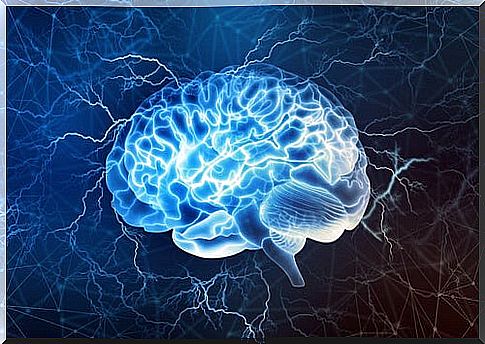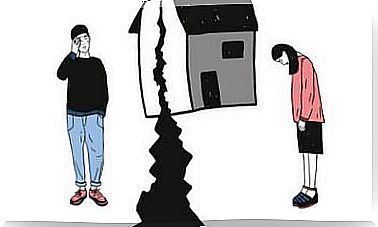Living With Anticipatory Anxiety: What Can We Do?

Living with anticipatory anxiety is not being able to breathe because uncertainty and worry take our breath away. It is falling prey to a hasty mind that strives to bring about the most fatal results.
Few experiences are as disabling as feeling blocked by this permanent anguish, in which our bodies and thoughts are gripped by fear.
If we could describe in a simple way what anticipatory anxiety is, we would basically say that it is a mechanism through which the mind tries to predict the future and creates a negative projection in the face of an event that has not happened yet.
Why do we do this? Why are we becoming a society increasingly afflicted with this particular type of anxiety?
What we need to understand about anxiety
To answer this question, we must understand two very simple aspects that define most of us.
- The first is that if there is anything that human beings need, almost by instinct, it is to have everything under control;
- The second is our absolute fear of uncertainty; we don’t tolerate it, we don’t handle it well, it hurts us and frustrates us more than we think.
Thus, realities as common as facing a job interview, an exam, a doctor’s appointment or the simple fact of asking ourselves if we can pay all the bills in the next month often lead us down a mental path in which only fatalities grow .
We anticipate the worst and this idea blocks us and erases all our resources to meet any challenge or goal.

Living with Anticipatory Anxiety: When Fear Causes Everything to Collapse
People spend a lot of their time worrying. This is not always a problem in itself, if such concerns are properly addressed.
In what way? By using a fair and balanced anxiety level, we can put this combined level of alertness to our advantage and, in addition, we can have a flexible and positive mental approach to face the difficulties of everyday life.
However, achieving this is not always so easy. And it’s not that easy because our brains are controlled primarily by instincts, not reason. Something like this makes, for example, in a situation of uncertainty, our imagination tends to anticipate the worst.
This feeling of anguish immediately stimulates the amygdala, the brain region related to the fear circuit and responsible for ‘triggering’ a whole stream of physiological responses by releasing hormones such as cortisol.
The reason why certain people, and not others, end up developing anticipatory anxiety could be related to exactly this structure. A survey by the University of Wisconsin-Madison published in the journal Nature indicates that there are brains more ‘reactive’ to uncertainty and threat.
That is, there are people who, neurologically, tolerate these types of situations much worse and therefore react with heightened anxiety.

Symptoms that arise when living with anticipatory anxiety
Living with anxiety is not living. It is paralyzed in an anteroom in which the mind strives to predict the future and, at the same time, whisper the dire consequences that can happen.
No matter what you have designed, no matter what you have to do today, tomorrow or five years from now, everything will go wrong.
- Likewise, this feeling of constant alertness accompanies feelings of insecurity, sadness at feeling helpless, and also anger at not knowing what to do.
- Thinking is obsessive, cognitive distortions are frequent, and we can see a clearly biased reality, a world in which we are not present because we only direct our gaze through a highly negative focus.
- Living with anticipatory anxiety is living in fear. Therefore, this implies experiencing the most diverse physical symptoms, from tremors, sweating, stomach pain, tachycardia, etc. This psychological condition ends up causing panic attacks.
How to reduce our anticipatory anxiety to live better?
Horacio, the great Latin poet, said that adversity has the gift of awakening talents that, in prosperity, had remained dormant.
Our reality and this world in which we find ourselves are marked, very often, by unforeseen changes, pressures, people who escape our control and small and large adversities that we are forced to face.
However, no one taught us how to do all these things. In fact, our brain doesn’t seem to be prepared to assume so much uncertainty. Being afraid, therefore, is normal.
On the other hand, letting fear dominate us completely is not. The key to not living with anticipatory anxiety and gaining well-being involves reflecting on these aspects:
- The emotion felt should not define your conduct. Feeling fear and anguish about something is completely normal. Admit these emotions, normalize them, but don’t let them define your behavior by dominating your thoughts.
- You are in control of your thoughts. So don’t let your mind stay too long in these black holes where fear paralyzes. Oxygen your mind, relax your thinking by focusing on the outside to relax, to find balance in the present moment. What matters is now, tomorrow hasn’t happened yet.
- Practice spontaneity, break patterns. Fear and negative thoughts feed on us when we are quiet, when routine oxidizes us and the brain loses motivation to drift into ruminant and obsessive thinking. Move, don’t think, just feel, get your body moving with some sport, relax your mind with mindfulness and animate your heart by connecting with new planes and new faces.
mindfulness in depression

To conclude, we can all suffer from anticipatory anxiety at some point. Many of the contexts we normally live in can cause the demon of fear to get us.
So falling into these states doesn’t make us weaker, it actually gives us an opportunity to become stronger people. We can become minds that learn to apply new resources and better skills to live happily.









